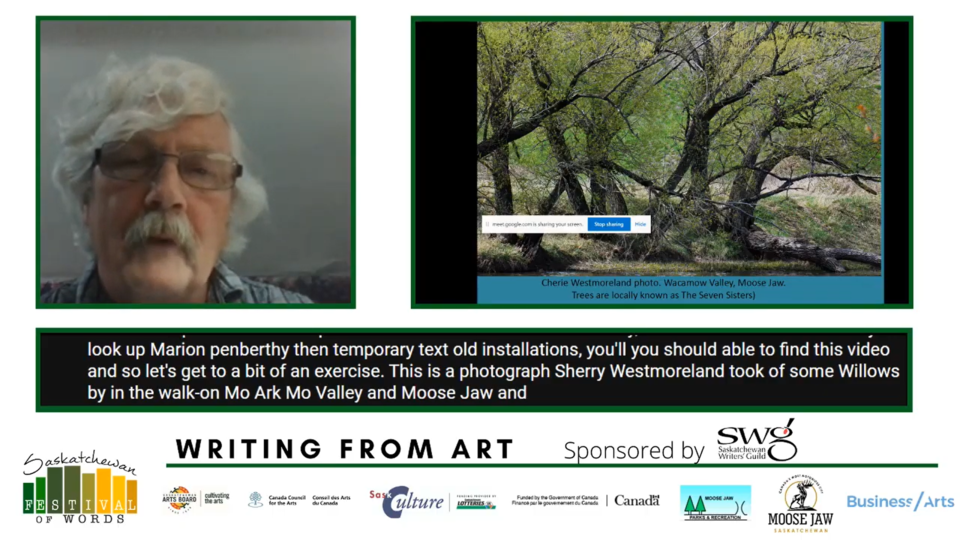Award-winning writer and current Saskatchewan Poet Laureate Bruce Rice hosted the first virtual workshop at this year’s Festival of Words, sharing some of his knowledge about using artwork and visual spaces as inspiration for writing.
When referencing art during his presentation, Rice extended the definition of the word to include both the traditional forms that most people imagine — things like sculpture, photographs, paintings, and so on — as well as the art of natural landscapes, locations. He also spoke about art as community spaces that are familiar enough to be recognized by many, such as the Cathedral neighbourhood in Regina that he calls home.
Rice began his instruction session by lauding the convenient closeness of the art community here in Saskatchewan, as his first piece of advice when approaching a writing project that utilizes a piece of visual art as a basis is to be sensitive to the original artist, seeking their permissions where possible.
Further in the strain of sensitivity, Rice explained how important it is to consider the voice of the “other” when using an art source, especially when that source is a location, landsite, or structure of significance, and to do due diligence in terms of researching history.
“Who the ‘other’ is may change very much depending on who you are and what you care about,” said Rice. “There’s something called ‘tourist religiosity,’ where people go to these [natural landmarks and sites] and they impose their own beliefs [and] the important thing there is to put your ego away and let the place speak to you.”
The next very important nugget of knowledge he shared: this discussion is about writing from art, not writing about art.
Rice describes the mentality as immersing oneself within the artwork of choice, and allowing it to push at the boundaries of language and help inspire a narrative.
Whether writing from the perspective of the artist or the artwork, finding a connection with the source art that is deeper than the visual surface is an important step, said Rice.
“When you write from art, that’s where we are, we’re embedded in the art. That’s a conversation we’re having, with both the art and the artist, and it’s a two-way conversation,” he said.
The idea of becoming part of the art continued, as Rice explained that even writing itself is art and carries with it a kind of power to change lives.
“Although we might be writing about the art of another artist, as writers we are artists and so we’re also meeting ourselves when we do that writing, and it does change the way we internalize that,” said Rice. “When we write about a piece of art, we are actually creating a bigger space in the imagination, where the art has its own space and we’re bringing in another layer.”
Using a series of photos from photographer Cherie Westmoreland, featured in his published collection Life in the Canopy, Rice also detailed how an image can inspire a narrative as a type of source material — an interesting intersection between the world of visual art and written word that he thinks is beginning to evolve in the broader community.
During the question and answer session with moderator and the Festival board of director Melanie McFarlane, Rice explained what he has been witnessing as of late, especially during the pandemic.
“I think in Saskatchewan, the challenge is to find new ways of doing some of the things we’ve been doing,” said Rice, adding that there is a tight connection between many in the visual and literary communities.
“And I believe that writing in art is transforming, and critics just haven’t caught up yet [and here in Saskatchewan] I believe that history is changing right now and it’s changing for the better, that these two worlds are coming together.”
The Festival of Words continues until July 19, with a full schedule of events available here.
Stay tuned for coverage of the Festival as it progresses through the coming week.




